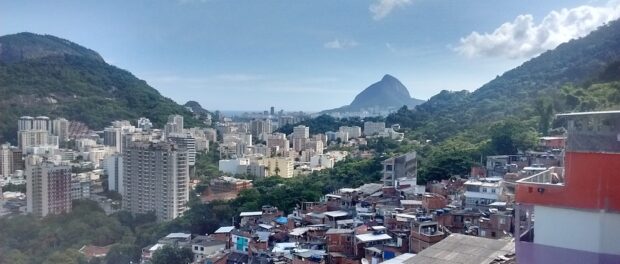
For the original article by Agência Brasil in Portuguese published by Carta Capital on February 16, 2015, click here.
Study shows that 47% of people living in formal city neighborhoods would never hire a favela resident to work in their homes.
A study by the Institute of Popular Data shows that residents of the formal city, known colloquially as “the asphalt,” still hold prejudices about people who live in the informal city, or favelas. Researchers spoke with 3,050 in 150 cities throughout the country between January 15 and 19.
The study finds that 47% of people living in formalized city neighborhoods would never hire a favela resident to work in their homes. Renato Meirelles, president of the Institute of Popular Data, notes that Rio de Janeiro is the exception, since a third of its female favela workforce is employed as domestic workers. “In Rio, we see a phenomenon not present in other metropolitan areas, which is a greater number of favelas located near the wealthier parts of the city,” he says. This explains the greater interaction between asphalt and favela residents in Rio de Janeiro.
Meirelles identifies another significant fact of this relationship: “In Rio, we found a lot of people who did not explicitly tell their bosses they lived in a favela. It’s common to find cases of people giving very vague information about where they actually live.”
The study reveals a prejudice regarding violence: 69% of asphalt residents interviewed said they felt afraid when they were near a favela, and 51% reported “drugs” and “violence” as the first words that came to mind when they hear about favelas. “They’re afraid that if they hire someone who lives in a favela they will become another victim of robbery or assault, as if all favela residents were criminals. In reality, we know that criminality is a minor part of life in the favela.” Meirelles believes that violence is as present today in the asphalt neighborhoods as it is in the favelas.
The stigma of crime “dates from the beginnings of the favelas–which emerged from occupation in the absence of government,” says Meirelles. This absence left an opening for drug trafficking to move into the communities and assume control as well.
According to Meirelles, the association of drugs and violence with the favelas is a stereotype fed by a stream of negative press about the communities. He suspects there is a cultural dynamic behind the image asphalt residents hold of people in favelas.
While the data are alarming, Meirelles says, it would have been worse ten years ago. “Because for the last ten years, you’ve had the pacification of some favelas, and also soap operas that take place in favelas or other outlying areas exploring themes other than violence.” The book A Country Called Favela, published in 2014 by the Institute of Popular Data, placed favelas at the center of the electoral debate.
Meirelles says that lately he has been hearing a deeper discussion about the reality of the favelas. “That’s good.” He points out that favela entrepreneurship is growing rapidly. Two-thirds of favela residents who ten years ago belonged to social classes D and E moved up to class C as the country’s economy improved. However, favela residents still face the barrier of prejudice as they attempt to overcome difficulties related to the state’s absence in their communities, and lack of educational access.
Securing a decent job is also more difficult, he says, since most favela residents are black and more households are led by women, who earn less than men. There is a lower rate of education in favelas than on the asphalt. “In other words, people in favelas have far fewer opportunities than those on the asphalt to open their own businesses, get good jobs, and make economic progress.”
The full study was released at the 2nd New Brazilian Favela Forum at the Tomie Ohtake Institute in São Paulo on March 3. During the event, another study was presented in which 2,000 Brazilian favela residents shared their views regarding asphalt residents. They also discussed what they do for entertainment, their consumption preferences, and what they buy in favelas.
